
Challenges of Entrepreneurship: 7 Things To Be Aware Of
Oct 08, 2025 6 Min Read 1330 Views
(Last Updated)
Have you ever thought about what truly stands between a groundbreaking idea and a successful startup? While many can have ideas, only a few make it a reality.
Entrepreneurship often evokes images of freedom, innovation, and financial independence, but the path to building a thriving business is anything but straightforward. From finding the right market fit to managing finances, assembling a capable team, and staying mentally resilient, the journey is filled with challenges that test your resolve at every step.
In this article, we’ll walk through the key challenges of entrepreneurship you’re likely to encounter – from finding the right idea and securing funding to building a team, competing in the market, managing growth, and even keeping yourself healthy – and how you might tackle each. So, without further ado, let us get started.
Table of contents
- Challenges of Entrepreneurship
- Choosing and Validating Your Idea
- Funding and Financial Management
- Building Your Team and Culture
- Competing and Differentiating
- Scaling Your Venture
- Burnout and Well-being
- Legal and Regulatory Hurdles
- Conclusion
- FAQs
- What are the biggest challenges of entrepreneurship?
- How do entrepreneurs deal with funding and cash flow problems?
- What makes finding the right product–market fit difficult?
- Why is building a strong team such a common struggle?
- How can founders avoid burnout while running a business?
Challenges of Entrepreneurship
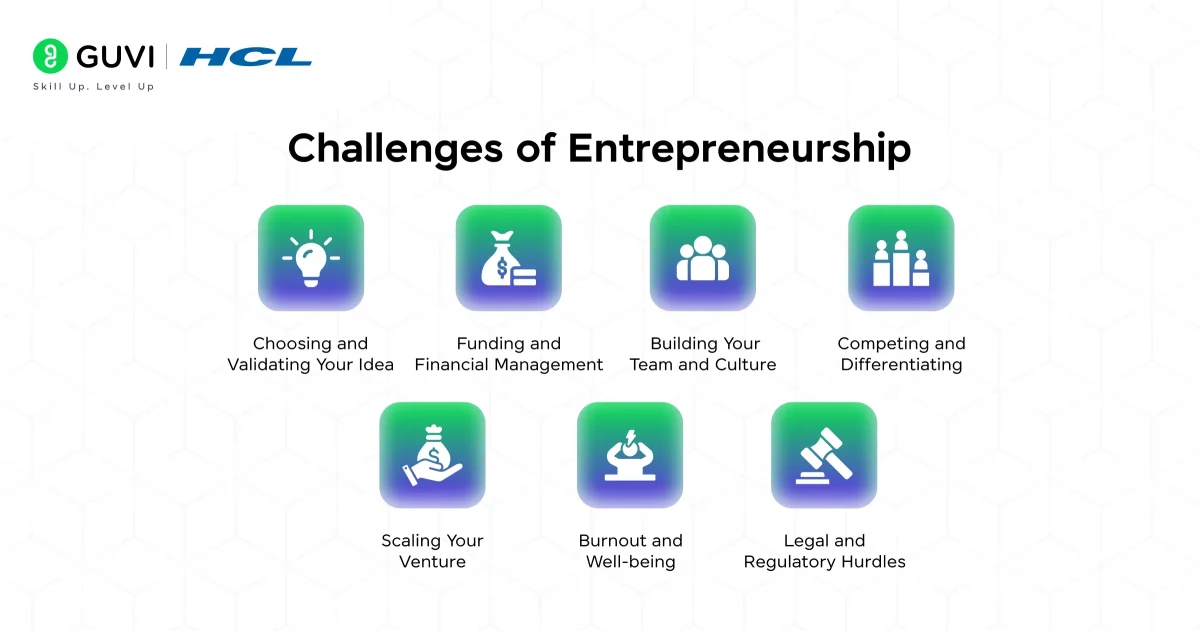
More startups fail than succeed; in fact, “more than two-thirds” of start-ups never deliver a positive return to investors. This isn’t to scare you, but to make you aware: every great idea faces hurdles on the way to success. So, here is a list of some common challenges of entrepreneurship that you should keep in mind:
1. Choosing and Validating Your Idea

Before anything else, you have to nail what you’re offering. Picking the right product or service is itself a big challenge. You might start with an exciting idea, but it must solve a real need. Ask yourself: Is there genuine demand?
Simply having passion is not enough; you need product–market fit. In other words, if customers don’t find a compelling reason to use your product, it won’t survive.
- Research your market. Talk to potential users before building the whole solution. Survey your audience or run small experiments to gauge interest.
- Be ready to pivot. Don’t fall in love with your first idea; be flexible. If feedback shows it’s not working, adjust.
- Watch out for “false profit.” In EdTech, especially, you may fall in love with the “impact” of your idea rather than its business sense. Make sure your idea isn’t just cool or mission-driven, but also viable, meaning it can make money or attract sustained support.
By focusing on solving real problems and validating your solution with potential customers, you’ll dramatically increase your chances of success.
2. Funding and Financial Management
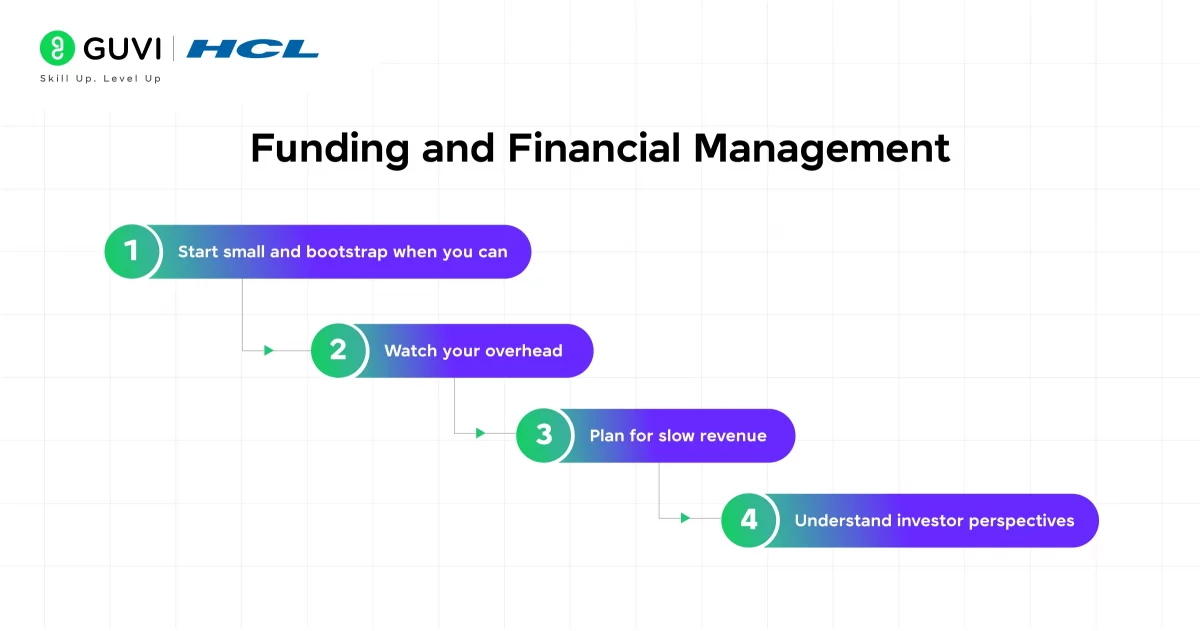
Money is the fuel that keeps your startup engine running, and finding it can be one of the toughest challenges. Cash flow is the lifeblood of any business, and many startups fail simply because they run out of money. Keep an eye on your financial runway and be smart about raising funds.
- Start small and bootstrap when you can. It’s normal to have some savings when you launch, but don’t burn it all at once. Many entrepreneurs start by serving a niche audience with what they have and grow gradually.
- Watch your overhead. Especially in the early days, keep costs lean. Founder Judah Longgrear advises against overhiring or spending too much too early – it’s tempting to grow fast, but that often backfires.
- Plan for slow revenue. Remember that even a great idea takes time to translate into sales. Be conservative in your projections..
- Understand investor perspectives. If you seek VC or angel funding, be aware of their biases. Make sure you’re prepared to answer tough questions about the market and competition, and consider bringing on an advisor or co-founder who adds business or tech credibility.
No one says raising money is easy. Nearly 30% of startups fail due to insufficient funding or poor budgeting. The key is to start with realistic goals, keep expenses tight, and explore creative funding approaches.
Explore: Mastering the Fundamentals of Entrepreneurship
3. Building Your Team and Culture
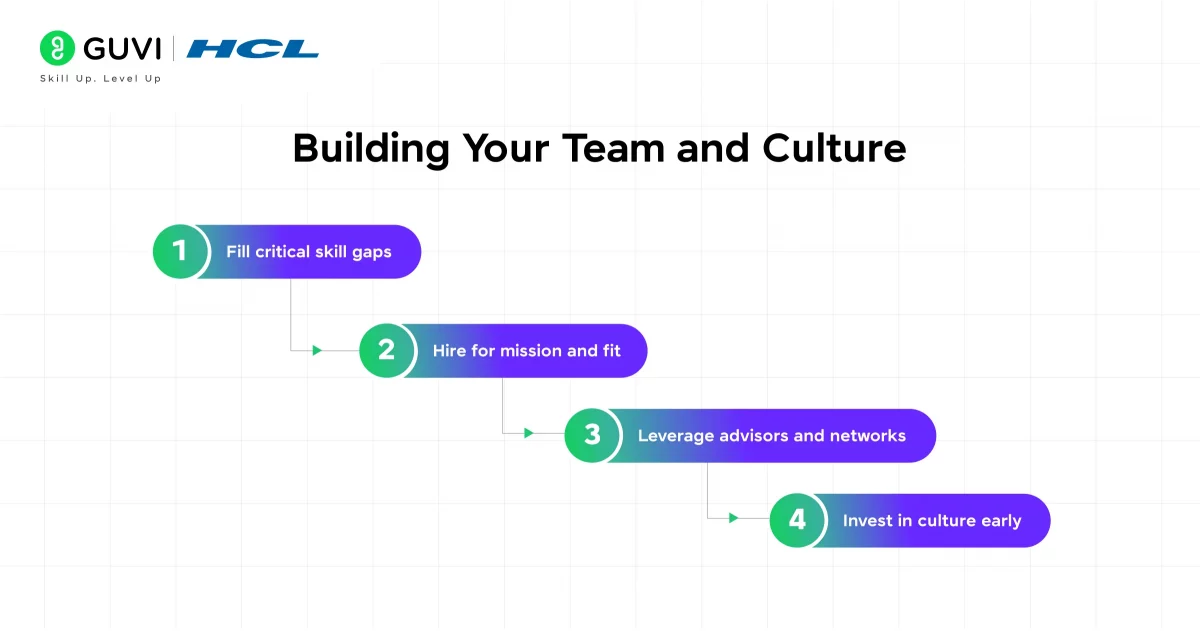
You might have a killer idea, but you can’t do it all alone. Building the right team – or supporting network – is crucial.
- Fill critical skill gaps. Honest self-assessment is key. What are you great at, and where are you weak? If you’re technical but business-shy (or vice versa), consider partnering with someone who complements you.
- Hire for mission and fit. When you do start hiring, recruit people who care about your mission and can grow with the company. Write clear job descriptions and ask questions that reveal both competence and passion.
- Leverage advisors and networks. You don’t need a co-founder in every area to succeed, especially early on. Seek mentorship or advisory relationships. Industry advisors can offer guidance on strategy, while networks can introduce you to talent and resources.
- Invest in culture early. The habits you set now will shape your company long-term. If you and any early teammates work 24/7, that can become the norm.
Mid-Article Challenge: Reflect and Act
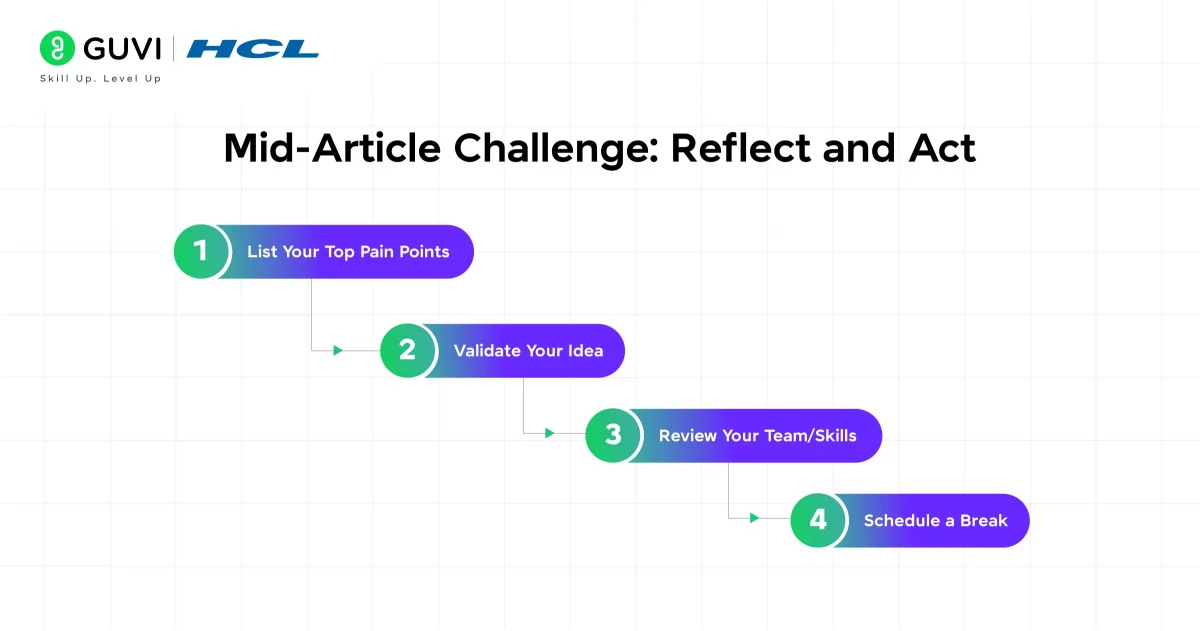
Take a moment away from the theory and think about yourself. What challenges are most pressing in your venture right now? Consider doing one (or more) of the following:
- List Your Top Pain Points: Write down the 3 biggest problems keeping you up at night (e.g., funding, marketing, technical hurdles, time management). Next to each, jot one action you could take this week.
- Validate Your Idea: If you haven’t already, talk to at least one potential customer or user. Ask for honest feedback on your idea or prototype.
- Review Your Team/Skills: Look at your team and identify any major skill gaps. Do you need a marketer, a developer, or a salesperson?
- Schedule a Break: Finally, check in with yourself. Are you burning out? If you’ve been working 80+ hours a week, block out some recovery time: a short walk, a workout, or even an early evening off.
By facing these challenges head-on, even with small steps, you’ll build momentum.
Discover: Best Way to Start Entrepreneurship as a Career After College
4. Competing and Differentiating

No matter what you sell, you’re never alone in the market. Your competitors (old and new) will test your resolve every day.
- Know your rivals. Spend time researching similar products or services. What do they do well, and where do they fall short? Understanding competitors lets you identify your unique edge (your unique selling proposition).
- Continuously innovate. Competition changes fast. Even after launch, keep improving your offering. This might mean adding new features, improving quality, or simplifying the user experience.
- Build brand and presence. Sometimes being distinct isn’t just about features but also about story and image. Develop a clear brand identity and messaging that resonates with your audience. This could be as simple as a catchy name, logo, or tagline, or as rich as a compelling mission story on your website.
Remember: healthy competition can spur you to improve. Keep an eye on market trends and be willing to adapt.
5. Scaling Your Venture
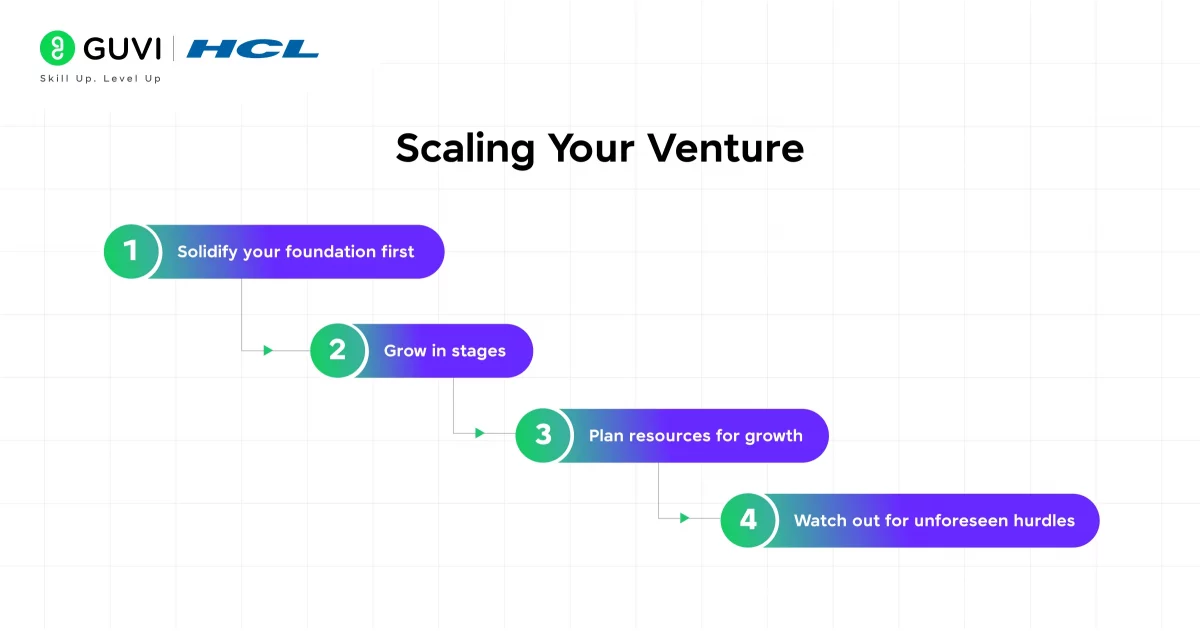
Growth is exciting – it means you’re gaining traction. But scaling too quickly, or without preparation, can be a disaster. Many startups stumble because they try to expand before they’re fully ready. Here’s how to scale smartly:
- Solidify your foundation first. Before reaching for new markets or big growth, make sure your core product, operations, and team are stable.
- Grow in stages. Think of scaling in phases. For example, first master your local market or a niche segment. Once you’re consistently serving them well, only then look to expand regionally or add new customer groups.
- Plan resources for growth. Rapid scaling often means higher expenses (more staff, more infrastructure, more customer support). Review your budget and cash flow projections: will you need another funding round? If so, do it early.
- Watch out for unforeseen hurdles. For example, do you need new permits or certifications in a larger market? Are there language or cultural differences? How about customer support challenges (time zones, multiple languages)? Each new territory or user group can bring unexpected costs.
Scaling is often described as “when things get hard, keep going”, but in reality, you should be ready to adapt or slow down if needed.
Find Out: Entrepreneurship Projects: Ideas, Types, and Getting Started
6. Burnout and Well-being
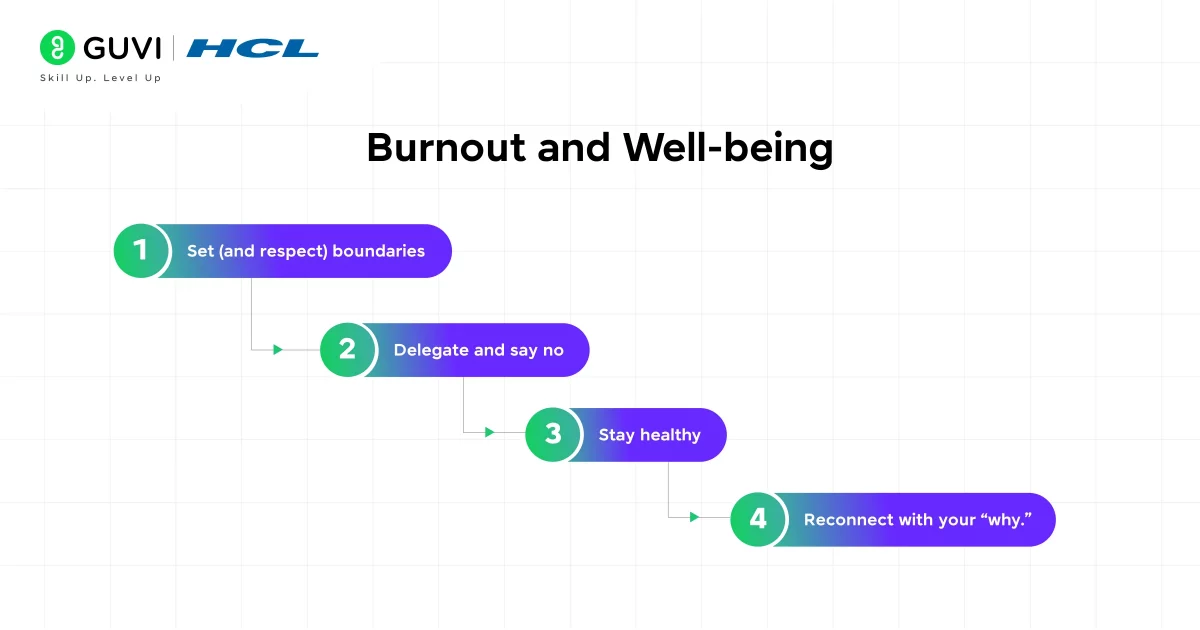
Entrepreneurship is a marathon, not a sprint – but it sure feels like a sprint when you’re in the middle of it. Startup life often means juggling countless tasks and working long hours. Founders frequently push themselves to 80 hours a week or more. While that dedication is admirable, it comes at a cost: your health, your relationships, and even your startup’s future.
To survive (and thrive), you must protect yourself. Entrepreneurs who have faced burnout emphasize stepping back to address the real stressors in their lives. Here are some strategies:
- Set (and respect) boundaries. Decide on “office hours,” even if it’s just turning off Slack after 8 PM. Schedule short breaks or vacations and take them.
- Delegate and say no. Remember, you don’t have to do everything. As your business grows, learn to delegate tasks to co-founders, employees, or contractors.
- Stay healthy. This isn’t a cliché: regular exercise, good sleep, and proper nutrition make you more resilient. If you start feeling rundown (headaches, insomnia, mood swings), listen to your body.
- Reconnect with your “why.” One common cure for burnout is remembering why you started. Revisit your original mission, talk to mentors or friends who believe in you, or remind yourself of early wins.
Don’t feel guilty about working less than 80 hours a week – it might even make you more effective. Your ability to lead and innovate hinges on your well-being.
7. Legal and Regulatory Hurdles
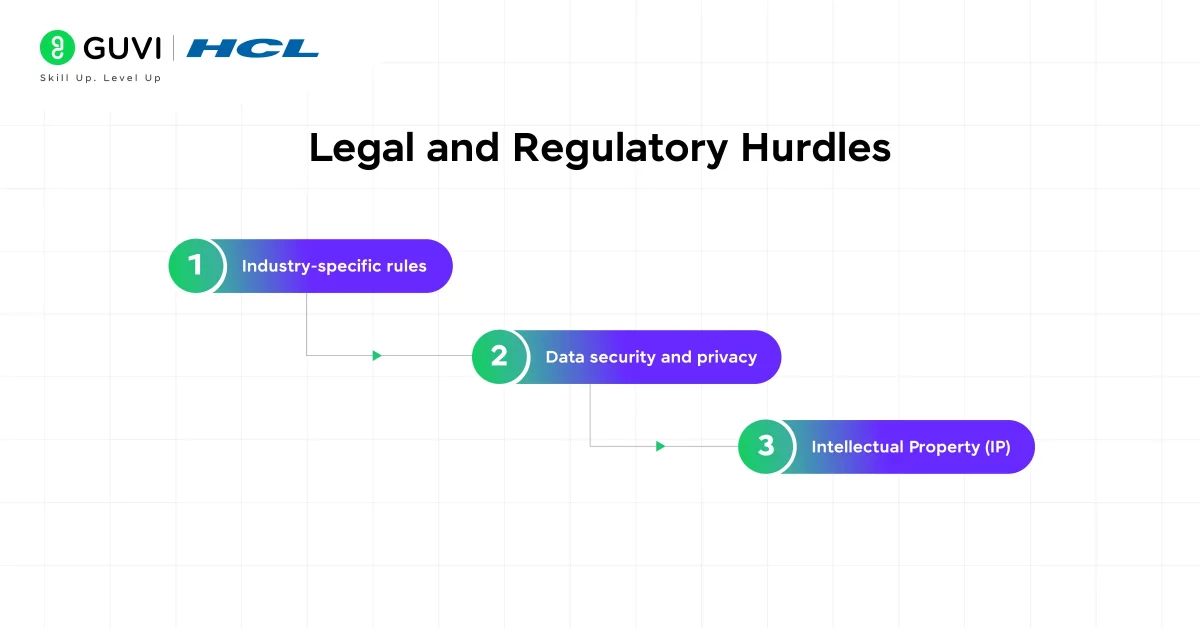
Entrepreneurs often think about product and customers, but laws and regulations are another mountain to climb. Ignoring this can be very costly.
- Industry-specific rules. Every sector has its red tape. For example, if you were in food, you’d need health inspections; in finance, you’d face stringent banking regulations; in healthcare, HIPAA; in education, things like student data privacy and curriculum standards.
- Data security and privacy. In almost every tech startup today, data security is mandatory. You should establish policies on how you handle user data, secure your servers, and respond to breaches. Even if you’re small, treat data seriously: one breach can ruin your reputation.
- Intellectual Property (IP). Finally, think about your IP and others’ IP. Trademark your brand if you can, and be careful you’re not infringing on someone else’s patents or copyrights.
In short, don’t be afraid of the law – be proactive with it. Early investment in legal compliance can save huge headaches later. Keep up-to-date on regulations in your field, and if you’re venturing beyond your home market, learn the local rules there too.
If you want to learn more about Entrepreneurship, along with a set of Full-stack skills, then consider enrolling in HCL GUVI’s IIT-D Certified Entrepreneurship Course, which is a unique blend of skills training to enhance your expertise and capabilities in full-stack, also strengthening your entrepreneurial attitude & skillset.
Conclusion
In conclusion, the above-mentioned challenges of entrepreneurship are part of the startup game. From validating your idea and securing funds to finding co-founders, outsmarting competitors, managing growth, staying sane, and obeying the rules, each hurdle can feel daunting.
But remember: every founder faces these obstacles at some point. What sets successful entrepreneurs apart is their persistence, adaptability, and willingness to learn.
You’re not alone in facing these hurdles. Keep learning, keep networking with fellow entrepreneurs, and keep pushing your idea forward. Every obstacle overcome is a step closer to the success you envision.
FAQs
1. What are the biggest challenges of entrepreneurship?
The most frequent obstacles include securing adequate funding, identifying a product–market fit, assembling a strong team, and battling competition. Poor financial planning and weak market validation often lie at the heart of these issues. Overcoming them typically requires intentional strategy, adaptability, and ongoing validation.
2. How do entrepreneurs deal with funding and cash flow problems?
Entrepreneurs manage this by bootstrapping, seeking small loans, or exploring grants and crowdfunding. Smart budgeting, cost control, and staging hiring allows you to stretch your runway. Predicting slow revenue and preparing for it is key to sustaining operations.
3. What makes finding the right product–market fit difficult?
4. Why is building a strong team such a common struggle?
Entrepreneurs often lack complementary skills or over-control, leading to gaps in marketing, tech, or operations. Wrong hires can drain resources and slow growth, while good hires accelerate progress. Focusing on mission alignment, skills, and early cultural fit helps build a resilient team.
5. How can founders avoid burnout while running a business?
Burnout happens when founders work excessively without boundaries or breaks, impacting their health and decision-making. The fix includes setting clear work/life boundaries, delegating tasks, and scheduling recovery time. Staying mindful of mental and physical health helps maintain energy and leadership clarity.




































Did you enjoy this article?